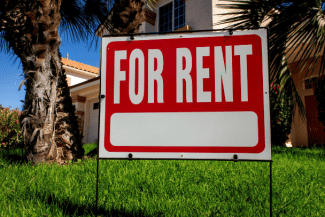Your Tenant Hasn’t Paid Rent – Now What

Speaking with tenants about rent arrears is a delicate issue. If the tenant is in financial difficulty, they may be agitated, frustrated, and worried—especially if they face eviction. So, how you deal with tenants who haven’t paid rent can help resolve the issue or make it worse.
What should you do if your tenant hasn’t paid rent? This article looks at six ways that landlords can rectify rent payment problems.
How to Deal with Tenants Who’ve Missed a Rent Payment
Before looking at the best ways to resolve late rent issues, there are three vital things to remember. These are:
- Stay calm—It’s vital to keep your nerve and avoid getting angry with the tenant. You need to be firm in your approach but show empathy, at least until you find out the reason for missing rent.
- Document everything—Make sure and document any meetings or phone calls with the tenant. This way, you’ll have a more robust case if the situation escalates.
- Be fair but firm—Start with tenants as you mean to continue. If you start letting a tenant off with late payments, they may not pay any rent. Or, you may drop down on their list of urgent debt payments.
6 Things to Do if a Tenant Doesn’t Pay Rent
Let’s look at six steps you can take with tenants who pay rent late or default on the rental payments.
1. Check your records
Check your payment records and lease documents before any confrontation with a delinquent tenant. Sometimes, landlords may think that payment is late, when in fact the tenant paid on time. Also, check the terms of the lease. Does the contract allow for a grace period? If so, then you’ll have to wait a few days before confronting the tenant.
If the tenant’s rent payment is late, you must act in line with the lease agreement. This could include charging late payment fees—but only if these are a part of the lease. Unfortunately, if the rental contract doesn’t allow for late fees, you can’t charge them.
However, non-payment of rent or paying rent late is a breach of contract. In these cases, you can take further action.
2. Talk with your tenant
After checking that rent is indeed late, it’s always best to speak with your tenant first. They may have forgotten to pay or run into financial problems. You can remind them how much rent is due, when it’s due, and when you should expect payment.
In some cases, you may let them pay at a later time or in installments. However, handle these situations carefully. Allowing to pay rent at a later date should only be a one-off arrangement. If you arrange payment for a later date or take two or three installments, put it in writing.
3. Send a late rent notice
If a tenant hasn’t paid rent, the next step is to send a “pay or quit” notice. This formal letter is a potent reminder to the tenant to pay rent. In many cases, seeing that they could face legal proceedings is enough to come up with the rent money.
A “pay or quit” notice is the best way to move up a tenant’s list of most urgent debt payments.
The late rent notice should state how much rent is due, the total amount of fees owed, and warnings about legal action. You should then mail the document and get a return receipt to prove delivery. Alternatively, you can email the tenant or tape the notice to the door of the rental property.
According to legal experts, most states require that you give a tenant three to five days to pay the rent. But in some states, you can demand eviction immediately if rent is late.
4. Call the tenant
A few days after sending the late rent notice, call the tenant to make sure they received it. This should be a courtesy call, not a threat, and you should only call once. In some areas, making more than one unsolicited call to a tenant to demand rent can lead to harassment claims.
5. File an eviction notice
If a delinquent tenant fails to pay rent and continues living in the property, you need to file for eviction. You should do this as soon as the “pay or quit” waiting period expires. The eviction process can take months, and during this time, you can’t evict the tenant, and you may not get rent payments.
As part of the eviction process, landlords need to prove that they’ve followed all the legal requirements. These documents include:
- Evidence that the tenant hasn’t paid rent
- The “Pay or Quit” notice
- Other documents proving that the tenant is in breach of contract
When you have a court date, arrive at court with all your documented evidence to prove that the tenant should be evicted.
6. Offer keys for cash resolution
One ideal solution if a tenant hasn’t paid rent is to pay for them to leave the rental unit. This is called a “keys for cash” offer. This way, landlords can avoid a lengthy and costly eviction process. In most cases, it’s cheaper to give the tenant cash for them to be on their way quickly.
You can also explain to the tenant why this solution is in their benefit. After all, an eviction will impact their credit history and may even prevent them from renting a new place.
Essential Things to Remember if a Tenant Hasn’t Paid Rent
As a responsible landlord, it’s vital to remember that you have legal requirements to meet. Of course, dealing with tenants to don’t pay rent and who may trash your property is never an ideal situation. But in many cases, state laws protect the tenant’s right to housing rather than a landlord’s rights.
If you have to deal with a rogue tenant, you need to make sure that your tenant doesn’t sue you. Here are some things to remember:
- Never carry out a self-eviction—Changing the locks or preventing the tenant from gaining access to the property is illegal before an eviction notice is served.
- Don’t accept partial rent payments—As long as the tenant is paying something, you will have problems evicting them. Always insist on rent payment in full.
- Document everything—The more documents you can bring to court, the better chance you have of a successful eviction. Take notes of phone calls and what was said. Keep all emails and written correspondence between you and the tenant.
- Double-check state laws—Always check local laws about landlords’ rights if tenants don’t pay rent.
When Tenants Don’t Pay Rent: In Conclusion
Tenants who don’t pay rent constitute a significant problem for landlords. In many cases, thorough screening can help ensure that you get responsible tenants in your properties. Also, many landlords offer tenants ways to pay rent online or use property management apps that send out rent reminders.
If tenants are late with a rent payment, it’s crucial to show understanding and firmness. If the tenant doesn’t pay rent, then landlords have no choice but to follow state laws to collect late rent and eventually evict rogue tenants.
Author: Remen Okoruwa, Cofounder & CEO of RentDrop.
RentDrop provides free software to help DIY landlords and property managers reduce the stress of rental management. We provide tools to help users collect rent, screen tenants, list vacant units, and handle maintenance requests. You can find us online at www.rentdrop.io















 Accessibility
Accessibility